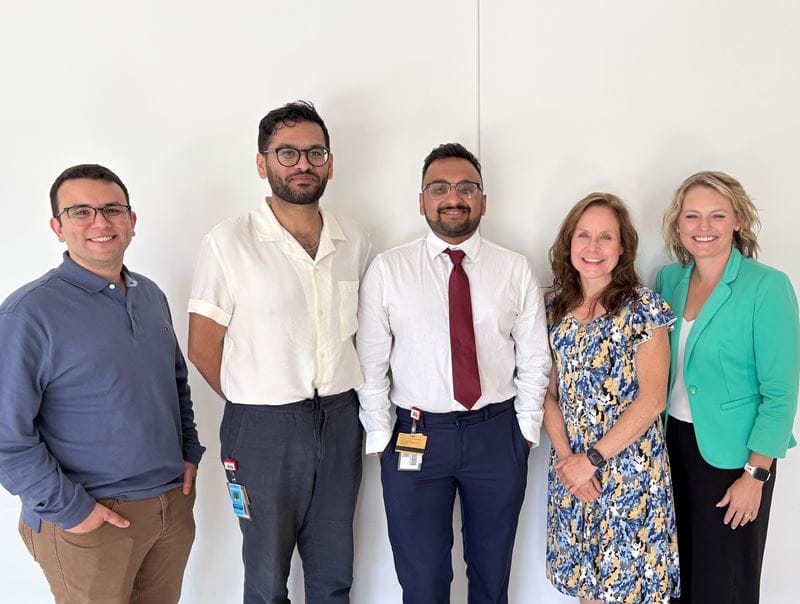Current Fellows

Amer Alboush, MD; Omair Syed, MD; Amith Rao, MD; Deborah Mack, MD; and Erin Boente, MD.

Amer Alboush, MD; Omair Syed, MD; Amith Rao, MD; Deborah Mack, MD; and Erin Boente, MD.
Hospice & Palliative Medicine Fellow
I have been practicing emergency medicine for the past 13 years and am very excited to embark on the next phase of my career by completing this fellowship. I currently live in Indianapolis with my family and our two dogs. I enjoy spending time with my family, being outside, traveling, gardening, exercising and doing projects around the house.
Hospice & Palliative Medicine Fellow
I am excited to move back to the Midwest to continue my training! I love traveling and trying new restaurants, and I'm excited to taste the brewery scene in Indianapolis and explore the numerous hiking trails and green space in the city.
Hospice & Palliative Medicine - Pediatrics Fellow
Besides medicine, my passions include travel, working out, cooking, outdoor adventures, and spiritual development. I’m excited and humbled to begin this new chapter of my career, as I seek to learn from, walk with and serve individuals and families challenged with life-limiting medical conditions.
Hospice & Palliative Medicine - Hematology Oncology Fellow
My professional pursuits are deeply rooted in advancing health outcomes, enhancing global health initiatives and fostering holistic approaches to cancer care.
Outside of medicine, I can be found exploring nature, visiting museums and art galleries, watching documentaries on world history, and seeking out the best cafes for lattes and pastries.

Geriatrics-Palliative Fellow
Palliative Care at IU North

Palliative Fellow
Palliative Care at Sutter East Bay Medical Group

Palliative Fellow
Palliative Care and Neurology with IU Health

Palliative Fellow
Palliative Care at Franciscan Health Lafayette Hospital
“The year I spent in this program was the most enlightening (and most fun) year of my career to date. I chose this program due to its outstanding faculty and its culture of compassionate, patient-centered care, and it was everything I’d hoped for and more. There are so many opportunities to form meaningful connections with patients and families, and the faculty and staff are wonderfully warm and supportive. I learned a lot medically/academically, but even more importantly, this fellowship helped me to grow personally/emotionally/spiritually and prepared me well for the next phase of my career as a full-time palliative medicine specialist.”
“Eskenazi Hospital is a wonderful home base for the fellowship, exhibiting a culture of service to the community that is truly inspiring.”
“Everything I learned during the inpatient hospice experience turned out to be tremendously useful in my current job, as I have a much better understanding of how inpatient hospice works.”
“PalliTalk conference in Madison was exceptional, primarily for its stated purpose to further develop communication skills, though also for networking with peers in the palliative care world and building camaraderie with my co-fellows.”
“The reputations of the fellowship faculty as great clinicians, as well as educators and mentors, attracted me to the program. The HPM fellowship offered a wide variety of experiences in the all-to-brief year of fellowship training. I knew the core inpatient palliative care rotations would allow me to develop the skillset necessary to function as an inpatient palliative care physician, though I also appreciated the amount of elective time available to pursue my own interests and experiences that I otherwise may never have had.”
“The inpatient palliative care rotations gave me confidence in my ability to transition fairly easily into an inpatient palliative care position. I did leave Indiana to practice in a different state, though found no significant barriers in obtaining a position elsewhere.”
“The international elective in Eldoret, Kenya gave me an opportunity to join an inpatient palliative care team at the Moi Teaching and Referral Hospital, the site of a sustained, decades-long partnership that has become a model for global health work. While facilities and resources may vary from the US, I found my role on the team to be similar to that of the inpatient palliative care rotations. My time was predominantly spent having goals of care conversations with patients (often via interpreter) as well as symptom management. The team and patients there are familiar with having international visitors, so I did not feel to be a significant distraction, but rather an extra provider who could help the team accomplish the day's work. During my time, there was a nurse who had recently joined the palliative care team. I often would work with her and she would help with interpreting while I was able to provide education on palliative care topics (medications, communication strategies, prognostication).”
“This program also offers excellent work-life balance with focus on physician wellness.”